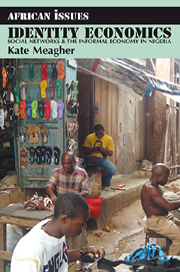Book contents
- Frontmatter
- Contents
- List of Figures & Tables
- Acknowledgements
- Abbreviations
- 1 Introduction
- 2 Beyond the Cultural Turn
- 3 Oracles, Secrets Societies & Hometown Identities
- 4 Unleashing Popular Entrepreneurship
- 5 The Scramble for Weak Ties
- 6 Negotiating the Web of Associational Life
- 7 Collective Efficiency or Cutthroat Cooperation?
- 8 Informality, Cliental Networks & Vigilantes
- 9 Missing Link or Missed Opportunity?
- Epilogue
- Appendices
- Bibliography
- Index
7 - Collective Efficiency or Cutthroat Cooperation?
Networks of Accumulation & Networks of Survival
Published online by Cambridge University Press: 05 April 2013
- Frontmatter
- Contents
- List of Figures & Tables
- Acknowledgements
- Abbreviations
- 1 Introduction
- 2 Beyond the Cultural Turn
- 3 Oracles, Secrets Societies & Hometown Identities
- 4 Unleashing Popular Entrepreneurship
- 5 The Scramble for Weak Ties
- 6 Negotiating the Web of Associational Life
- 7 Collective Efficiency or Cutthroat Cooperation?
- 8 Informality, Cliental Networks & Vigilantes
- 9 Missing Link or Missed Opportunity?
- Epilogue
- Appendices
- Bibliography
- Index
Summary
Introduction
Faced with the pressures of economic restructuring, Aba's informal producers have drawn on personal ties and associational strategies to restructure their enterprise networks, with uneven success. From the perspective of economic development, however, the critical issue is not whether individual producers have fared well or badly, but the collective impact of these various networking strategies at the level of the cluster as a whole. The complex interplay of informal organizational strategies in the Aba clusters raises questions about how relations of accumulation and survival, structure and agency, play themselves out at the cluster level. Does the proliferation of social and entrepreneurial networks promote economic growth or is it fostering the fragmentation of collective production systems in the face of extreme competition and economic hardship? Focusing on the complex array of networks unleashed by economic restructuring, this chapter will explore the link between individual economic strategies and wider structural, or ‘institutional’ consequences.
In Aba's shoe and garment clusters, it is not clear that enterprise networks are leading in the direction of collective efficiency. Patterns of personal networking and associational participation appear to be contributing to fragmentation and differentiation within clusters, creating informal organizational frameworks of structural inequality and social exclusion rather than cluster-wide solidarity. At the same time, there does appear to be some room for excluded firms to gain access to more advantageous networks through the strategic manipulation of social ties.
- Type
- Chapter
- Information
- Identity EconomicsSocial Networks and the Informal Economy in Nigeria, pp. 121 - 139Publisher: Boydell & BrewerPrint publication year: 2010



